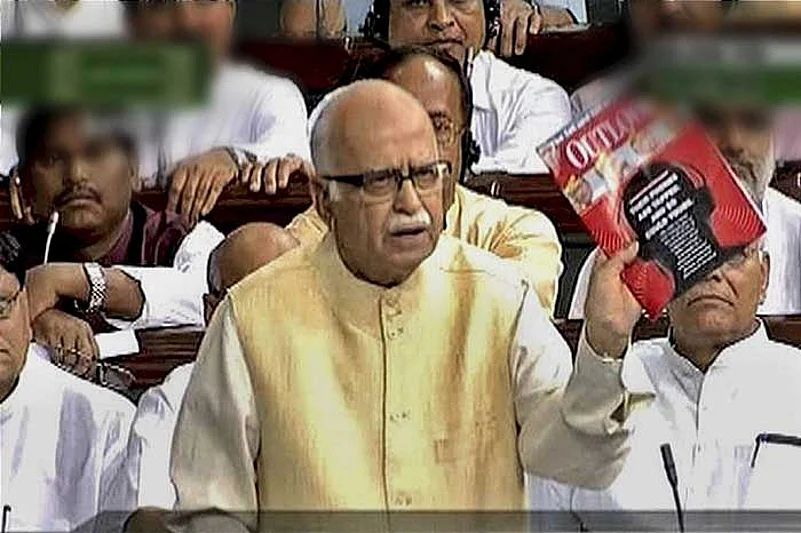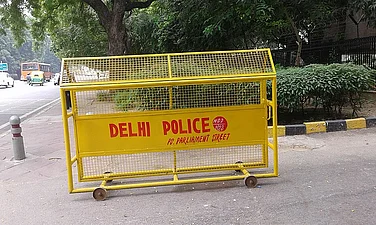- PC denies any authorisation to tap phones, but NTRO isn’t one of seven agencies mandated to tap.
- The minister calls NTRO a technical unit. But it was instituted by an intelligence task force post-Kargil.
- Narayanan was on the task force. Later, as NSA, he became the sole authority NTRO reported to.
- Home secy can authorise taps of specific numbers, with justification. NTRO’s ops were entirely outside.
***
Late on Thursday, April 29, as the irate debate on illegal phone-tapping raged in Rajya Sabha, Union home minister P. Chidambaram chose his words with care. “No authority was given to intercept the conversations of any politicians,” he insisted. And if illegal tapping had indeed been happening, he promised the government would get to the bottom of it. This line of defence—a careful separation of the official and the not-so-official—has been the government’s refuge ever since the Outlook expose last week on the tapping of mobile phones by the National Technical Research Organisation (NTRO). All legitimate cases of monitoring “are authorised by the Union home secretary”, he told Parliament three days earlier—and till now, “nothing has been found in the NTRO records or elsewhere”.
Now a continuing investigation by Outlook has thrown up startling details of more phones being tapped using the off-the-air-GSM/CDMA monitoring system and brings out fresh details about the intercepted conversations of political leaders mentioned in our earlier story (We, the Eavesdropped, May 3). Sample this:
- There’s a conversation between a UP minister and an engineer where they discuss postings of officers and also the money required to effect transfers.
- A senior bureaucrat in a ministry in South Block is heard discussing the payment of a bribe for a deal. The bribe is fixed for Rs 8 crore—he has already received Rs 3 crore and is now busy negotiating the balance of Rs 5 crore.
- A corporate boss is heard discussing the price for a young starlet who will fly in from Mumbai to Calcutta for seven days. The deal is struck for Rs 11 lakh.
- An air vice-marshal with the Western Air Command is under watch for several weeks. The tapes show that his wife is in touch with a beauty saloon that is running a major prostitution racket. This was one of the longest surveillance projects carried out by NTRO officials in the winter of 2006 as they parked their cars outside Subroto Park and Shankar Vihar in Delhi recording conversations.
The conversation between Congress leader Digvijay Singh and the leader from Punjab occurred at about the time of the state assembly elections in early ’07. Transcripts reveal that Digvijay got the call at about 11.30 am. They discuss the elections and then the state leader seeks Digvijay’s help in getting into the CWC, the Congress’s highest decision-making body. Digvijay is non-committal and discusses his own limitations in facilitating the request. Similarly, on October 27, ’07, Bihar CM Nitish Kumar is heard speaking on the cellphone of a then resident commissioner. The conversation is short but Nitish mentions two specific requests—help with the Planning Commission and more funds for projects on the Kosi river.
Furore & After
Claim: UPA government did not authorise telephone tapping or eavesdropping on political leaders
Response: Outlook did not say that the UPA government authorised the tapping. In fact, NTRO is not authorised to tap as per laws.
Claim: The NTRO machine was in Kashmir around the time Digvijay Singh was reported to have been tapped
Response: Outlook did not say there was only one machine at NTRO’s disposal
Claim: There was no CWC meet in the air as mentioned in Digvijay’s tap transcripts
Response: Transcripts are part of a longer conversation on the CWC and the Punjab elections
Claim: There was little to gain for Congress by tapping Nitish Kumar talking about central funds
Response: Before the 2009 general elections, Congress saw JD(U) as a potential partner in Bihar and would have been interested in keeping tabs
Question: If government has such cutting-edge technology, why does it not use it to stop
terrorists or Maoists?
Response: There have been several successes —a team of 30 terrorists infiltrating from Bangladesh was neutralised by the BSF. Maoist areas may be too dense, too vast for this technology.
The home minister’s statement says there was no authorisation for both these taps. But how could the NTRO seek authorisation to tap phones in the first place? According to Indian laws, only seven agencies are allowed to tap phones and NTRO is not among them. This raises a rather disturbing question: what was NTRO doing with these machines and how were they being deployed routinely in Delhi?
C hidambaram also states that all interceptions were authorised by the home secretary. But how could the home secretary authorise tapping by an agency not authorised to do so? Congress spokesperson Abhishek Manu Singhvi took another tack—that it may have been a legitimate security measure where inadvertently some other calls got recorded.
This was not the only discrepancy in PC’s statement. He also calls NTRO a “technical organisation”. In fact, the NTRO was set up as an intelligence-gathering agency in 2004 on the recommendations of a joint task force on intelligence headed by former raw chief Girish Saxena (set up after the Kargil war). One of the members of the task force in 2000 was retired IB director M.K. Narayanan who later went on to become NSA in the first UPA government.
Coming back to the home secretary’s role, he can only authorise interceptions after the agency shows justification for tapping a specific phone. Instead, NTRO vehicles carrying the off-the-air gsm/cdma monitoring devices would leave the base units regularly for routine “intelligence sweeps” in the heart of Delhi. Details of these trips are neatly recorded in an “operations logbook” marked ‘Top Secret’.
In eight columns, the logbook records the daily trips, areas of deployment and other details. Every day, the designated team leader would sign the logbook entries with remarks, if any. Project leaders and centre directors would then put their signatures to the opening and closing entries for each month along with sundry details such as total kilometres clocked, fuel averages etc. If this is matched with the purported “written authorisations” by the home secretary, it will show that the NTRO was breaking the law and its machines were being actively misused.
It’s entirely possible that the PM wasn’t aware of these secret missions. In fact, the NTRO chief was reporting only to the then NSA, M.K. Narayanan. No one else, say sources, had access to NTRO’s doings. “Till 26/11 happened, he controlled all the agencies,” says an intelligence official. Ironically, Chidambaram, now in the dock, has spent the bulk of his time in the home ministry trying to prevent the misuse of intelligence agencies. Experience across the world shows that incidents of illegal tapping invariably lead to parliamentary committees stepping in to investigate and stricter laws coming into force. Unfortunately, PM Manmohan Singh’s first reaction was to rule out a JPC to probe the charges. Therein hangs a tale.


























